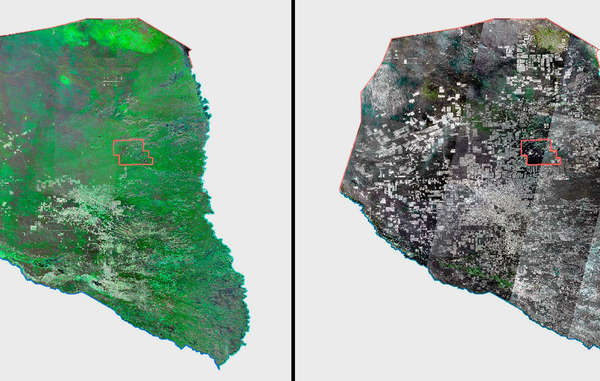Russian ad campaign targets Paraguay's most important beef market - News from Survival
- Details
- Published on Tuesday, 17 June 2014 11:40
- Written by editor

Russian ad campaign targets Paraguay’s most important beef market
 Survival’s new ad urges Russia to stop beef imports from Paraguay until the Ayoreo’s land is protected© Survival International
Survival’s new ad urges Russia to stop beef imports from Paraguay until the Ayoreo’s land is protected© Survival International
A new ad campaign has been launched in Russia warning people not to buy Paraguayan beef because of the risk the ranching industry poses to the Chaco’s uncontacted Indians.
Russia is the biggest importer of Paraguayan beef.
Beef company Yaguareté Porá is destroying vast swathes of forest inhabited by uncontacted Ayoreo Indians in Paraguay to make way for cattle destined for Russians’ dinner plates.
Satellite images have revealed that the company is destroying the last tracts of standing forest in the northern Chaco region of Paraguay, an area recently found to have the fastest rate of deforestation in the world.
Survival has launched an advertising campaign warning Russia to stop beef imports from Paraguay until the Ayoreo’s land is protected.
Contacted Ayoreo have demanded their legal right to the land being destroyed by Yaguarete Porá for more than twenty years.
Under Paraguayan and international law, the government has the duty to return the land to its ancestral owners: the Ayoreo.
Uncontacted Ayoreo depend on the forest for their survival, and face extinction if they come into contact with the ranchers.
 The Chaco woodlands of Bolivia, Paraguay and Argentina are under intensive pressure from agroindustrial development. Paraguay’s Chaco has the highest rate of deforestation in the world.
© Survival International
The Chaco woodlands of Bolivia, Paraguay and Argentina are under intensive pressure from agroindustrial development. Paraguay’s Chaco has the highest rate of deforestation in the world.
© Survival International
Many Ayoreo have already been forced out of the forest by ranchers and missionaries, and countless have contracted deadly diseases spread following first contact.
Satellite imagery has confirmed the Ayoreo’s innate ability to protect their forest, but their land is now an island of trees amidst massive forest clearances.
Russian social media networks and blogs have already published the warning over Paraguay’s beef, and dozens of media outlets have received Survival’s advert, which will continue to appear in the coming months.
Survival International’s Director Stephen Corry said today, “The good image of Paraguayan beef, one of the country’s most important exports, is being jeopardised by the actions of one renegade company. Unless the government can bring Yaguarete Porá under control, and block their plans to deforest most of their landholding, the whole country’s beef exports to Russia, its biggest buyer, will be placed in jeopardy. Few will want to buy beef that could have been produced by cutting down the last refuge of the uncontacted Totobiegosode Indians.”
Read this online: http://www.survivalinternational.org/news/10284
Indigenous boy protests on pitch during World Cup opening ceremony
 An indigenous Guarani boy held up a banner reading 'Demarcation Now!' at the World Cup's opening ceremony.© Luiz Pires/CGY
An indigenous Guarani boy held up a banner reading 'Demarcation Now!' at the World Cup's opening ceremony.© Luiz Pires/CGY
One of the three Brazilian children who released white doves during the World Cup opening ceremony used the occasion to demand recognition of Indian land rights – but his protest was censored by FIFA.
Immediately after releasing a white dove, Jeguaká Mirim, an indigenous Guarani boy, held up a red banner reading ‘Demarcation Now!’ But his courageous protest was not broadcast, as the TV cameras swiftly cut away.
Jeguaká’s father, Guarani author Olívio Jekupe, said that the act “showed the world that we are not standing still… My son showed the world what we need the most: the demarcation of our lands.”
The Guarani are Brazil’s most numerous tribe and they live in five states. Much of their land has been stolen from them and is being used for cattle ranching and sugar cane production, whilst many Guarani are forced to live in overcrowded reserves or in roadside camps where malnutrition and disease are rife. Some, like Jeguaká’s community known as Krukutu, live near urban areas like São Paulo on almost no land.
As a result of the loss of their land, the Guarani-Kaiowá of Mato Grosso do Sul state suffer the highest suicide rate in the world, and their leaders are targeted and killed when they attempt to reoccupy patches of their ancestral land.
The Guarani, Survival International and other organizations are calling on the Brazilian government to uphold its own constitution and international law, and map out the Guarani’s land for their exclusive use.
Coca-Cola, one of the World Cup’s main sponsors, has recently become embroiled in the Guarani land scandal by buying sugar from US food giant Bunge, which sources sugar cane from their ancestral land. The Guarani are urging Coca-Cola to respect their rights and stop this purchase immediately.
 Coca-Cola and FIFA's image has been contrasted with an angry Indian man demanding, 'Let the Guarani live!'© Survival International
Coca-Cola and FIFA's image has been contrasted with an angry Indian man demanding, 'Let the Guarani live!'© Survival International
To highlight the deep irony of Coca-Cola and FIFA promoting the World Cup with an image of a happy Indian man with the words ‘Welcome to the World Cup for Everyone’, Survival has created a spoof ad featuring Nixiwaka, a Yawanawa Indian welcoming the viewer to ‘The Dark Side of Brazil’ and demanding ‘Let the Guarani live!’.
See Survival’s website on the ‘Dark Side of Brazil’ for more examples of Brazil’s assault on indigenous rights.
Read this online: http://www.survivalinternational.org/news/10292
Survival International USA, 2325 3rd Street, Suite 401, San Francisco, CA 94107, USA
T +1 415 503 1254
Survival International, 6 Charterhouse Buildings, London EC1M 7ET, UK
T +44(0)20 7687 8700
www.survivalinternational.org
